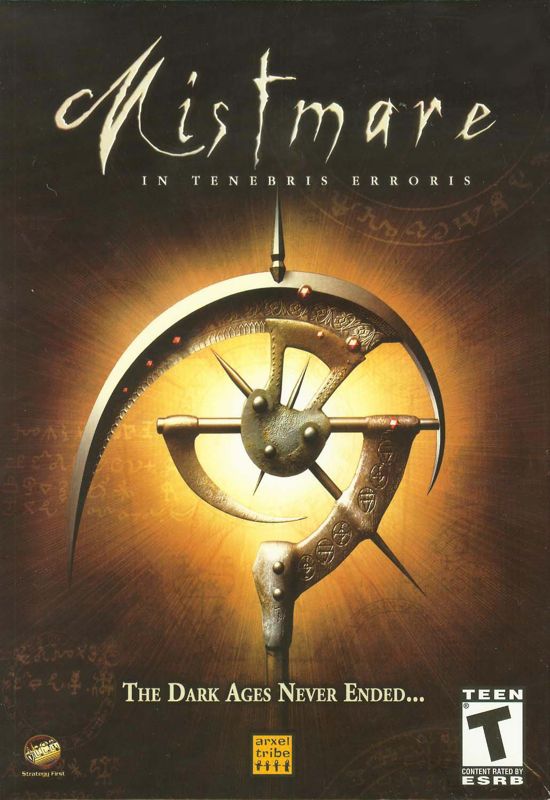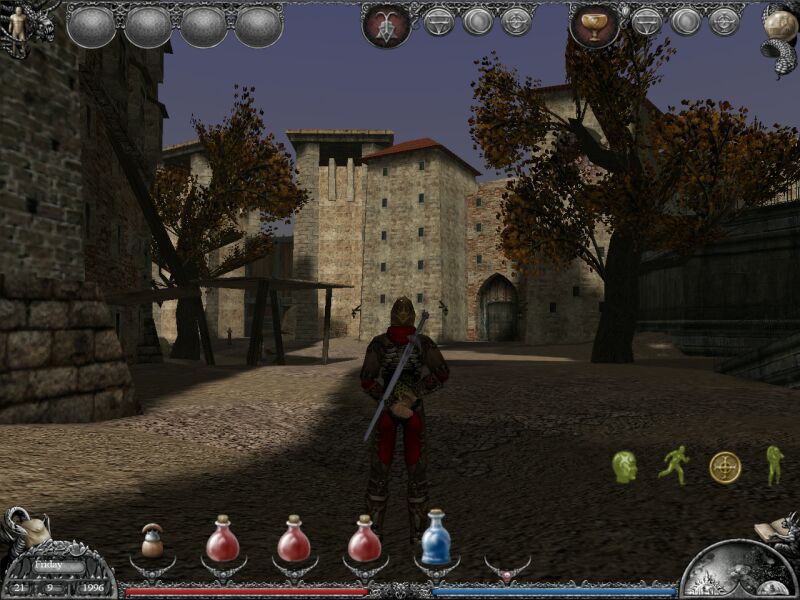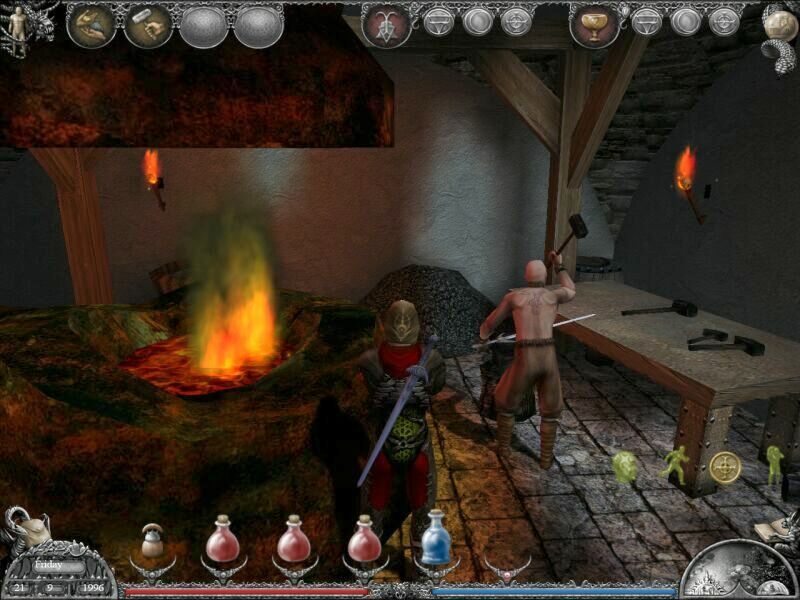Retro Replay Review
Gameplay
Mistmare delivers a distinctive take on real-time role-playing mechanics by blending first- and third-person perspectives. Players can seamlessly switch viewpoints, allowing for both a tactical overview and immersive, close-up encounters. Combat revolves around selecting attacks, “chords” (magic spells based on sounds), and other actions before clicking on an enemy. Once chosen, the AI will repeat that action automatically until the player issues a new command, which adds a layer of strategic planning without sacrificing the flow of battle.
(HEY YOU!! We hope you enjoy! We try not to run ads. So basically, this is a very expensive hobby running this site. Please consider joining us for updates, forums, and more. Network w/ us to make some cash or friends while retro gaming, and you can win some free retro games for posting. Okay, carry on 👍)
The internal clock is one of Mistmare’s most intriguing features, as certain events, quests, and NPC interactions only occur at specific times of day. This temporal system encourages careful scheduling: you might need to pray at dawn to bolster your magic, practice weight lifting at midday to increase strength, or investigate a suspicious fortress after nightfall. It injects a sense of urgency into the world and rewards players who pay close attention to the in-game schedule.
Character progression in Mistmare isn’t tied to an experience meter but to your actions and the special items you acquire. Want to become stronger? Lift heavy stones scattered through the countryside. Need greater magical prowess? Spend time in prayer halls or gather rare reagents that amplify your chords. This organic growth system feels more like living history than a power grind, though some players may find the lack of numerical feedback confusing at first.
That said, the learning curve can be steep. Newcomers to action-oriented RPGs might struggle with the AI-driven repetition mechanic, inadvertently looping an inappropriate spell or attack. Moreover, time-sensitive quests can be unforgiving if you lose track of the clock. But for those willing to invest the effort, mastering these systems yields a deeply satisfying gameplay loop: plan your day, strengthen your monk, and emerge victorious against ever-more-deadly foes.
Graphics
For a game set in an alternate 1996 without an industrial revolution, Mistmare’s fully 3D engine paints a surprisingly evocative medieval Europe. The world is steeped in gothic architecture—frost-rimed villages, mossy abbeys, and fog-shrouded forests—which help immerse the player in the game’s eerie atmosphere. Though vegetation and distant horizons sometimes look sparse, the overall mood is consistently haunting.
Character models range from simple peasants to imposing monsters of the mist, each animated with a rough-hewn charm. Combat animations have a certain jerky quality, especially when chaining spells or performing back-to-back sword strikes. While not as fluid as contemporary titles, these animations still convey enough impact to keep battles feeling weighty and consequential.
Lighting and sound play crucial roles in selling the mystique of the deadly fog that divides northern and southern Europe. Sunlight filtering through misty groves flickers realistically, and torches cast dancing shadows on castle walls. Subtle acoustic cues—distant howls, chanting monks, the clang of steel—help build tension before you even engage in combat.
On the downside, draw distances can be limited, leading to sudden pop-in of terrain or NPCs. Textures may appear blurred on modern high-resolution displays. However, these technical limitations are generally outweighed by the evocative art direction, which captures the spirit of the game’s dark, alternate-mediaeval setting.
Story
Mistmare’s narrative centers on Isidor, a monk endowed with the power to wield magic through sound. You begin your journey in a fractured Europe where a supernatural mist has cleaved the continent in two. Your primary goal is to unravel the mystery behind this deadly fog and restore fragile order to a world on the brink of chaos.
The game world is peppered with lore-rich NPCs—wandering troubadours, paranoid alchemists, and secretive inquisitors—each offering fragments of the greater puzzle. Dialogues occasionally suffer from rough translations, but the underlying intrigue remains potent. Uncovering hidden manuscripts in ruined abbeys or rescuing villagers from mist-born creatures fosters a genuine connection to the stakes at play.
Major story beats unfold through time-sensitive events, so missing a certain festival or ritual can alter your understanding of the mist’s origins. While this branching structure encourages multiple playthroughs, it can also lead to occasional frustration if you inadvertently skip a pivotal moment. Nevertheless, the sense of discovery—piecing together the history of a world untouched by industry—is consistently rewarding.
By the climax, you’ll have forged alliances with unlikely companions and mastered a diverse repertoire of chords. The final confrontation against the heart of the mist feels earned, though some players may wish for a deeper explanation of its metaphysical nature. Still, Mistmare’s story remains a memorable journey into a beautifully realized “what if” version of medieval Europe.
Overall Experience
Mistmare stands out as a niche gem for fans of unconventional RPGs. Its combination of sound-based magic, time-managed quests, and emergent character growth creates a gameplay tapestry unlike most late ’90s titles. There’s an undeniable sense of accomplishment when you harmonize the right chord at the precise moment, rally a battered village, and watch the fog recede.
However, the unique systems come with occasional rough edges. The AI combat loop can misfire, time-sensitive missions demand careful note-taking, and the visuals, while thematically strong, show their age in draw distance and texture quality. Patience and a willingness to explore every nook and cranny of the map are essential to fully appreciate what Mistmare has to offer.
In a modern context, Mistmare feels like an experimental prototype that ambitiously merges real-time action, sandbox exploration, and a dynamic calendar. Some aspects feel underpolished, yet the game’s atmosphere and creative spellcasting mechanics shine through. If you’re drawn to RPGs that challenge convention and immerse you in a richly detailed, if occasionally unforgiving, world, Mistmare is well worth experiencing.
Ultimately, Mistmare is a rewarding voyage for those who savor discovery over straightforward quests. It may not cater to all tastes, but for players seeking a medieval adventure laced with metaphysical mysteries and time-based intrigue, it remains a compelling—and delightfully odd—journey into a world shrouded by mist.
 Retro Replay Retro Replay gaming reviews, news, emulation, geek stuff and more!
Retro Replay Retro Replay gaming reviews, news, emulation, geek stuff and more!









Reviews
There are no reviews yet.